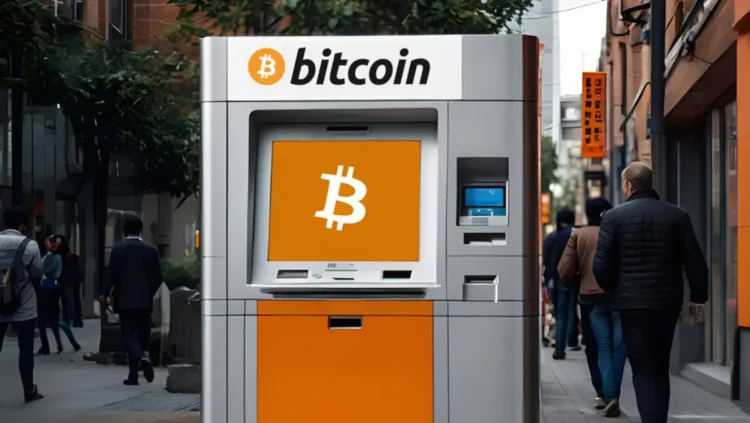Quick Breakdown:
- Crypto ATMs face bans in cities like Spokane (WA), Stillwater (MN), and Grosse Pointe Farms (MI), plus statewide limits in Rhode Island, Arizona, Iowa, Illinois, Colorado, and North Dakota, due to fraud, anonymity risks, and patchy regulation.
- Transaction caps and bans reduce accessibility, hitting unbanked communities hardest while frustrating users who value ATMs for convenience and privacy.
- Operators are adding stronger KYC/AML checks, collaborating with regulators, and shifting toward transparent, regulated business models to stay compliant.
Crypto ATMs, also called crypto kiosks or automatic teller machines, let users buy or sell cryptocurrencies using cash or debit cards. Most offer cash-to-crypto services, letting users deposit cash and receive cryptocurrency in a digital wallet. Some provide crypto-to-cash options, allowing users to convert their crypto back into physical cash.
Since 2020, the number of crypto ATM machines in the U.S. has grown rapidly, with thousands of installations nationwide. Crypto ATMs are also popular with the unbanked, offering a way to participate in the crypto economy without a conventional bank account. However, this growth has attracted increasing scrutiny.
Crypto ATM machines are facing pressure from regulators, including municipal bans in Spokane (Washington), Stillwater (Minnesota), and Grosse Pointe Farms (Michigan), as well as statewide restrictions in Rhode Island, Arizona, Iowa, Illinois, Colorado, and North Dakota. This regulatory push raises an important question: why exactly are crypto ATM limits and bans starting to sweep across the U.S.?
RELATED: Crypto Atms: Have They Been As Effective as Promised
Reasons for Restrictions
Fraudulent activity has become a major concern in the crypto ATM space. Scammers often exploit the quick and relatively anonymous nature of ATM transactions to defraud users, targeting both novice and experienced crypto holders.
Incidents range from phishing scams to fake ATMs that trick users into sending cryptocurrency to criminal-controlled wallets. These events have highlighted how easily money can be misappropriated, prompting regulators to tighten oversight.

Money Laundering and Anonymity Risks
Crypto ATM machines enable cash-to-crypto conversions, which can be difficult to trace. The ability to make small, anonymous transactions increases the risk of money laundering and other illicit activities. Regulators are particularly concerned that these machines can be exploited to move funds without the transparency required in traditional banking systems, creating gaps in AML (anti-money laundering) enforcement.
Lack of Standardized Regulation
Crypto ATM machine operators lack consistent rules at the federal and state levels. Some states have stringent licensing and reporting requirements, while others provide minimal oversight. This patchwork approach creates regulatory gaps that leave ATMs vulnerable to misuse and make compliance burdensome for operators.
Regulators’ Perspective on ATMs as a Compliance Weak Link
Due to these factors, regulators increasingly see crypto ATM machines as weak links in the financial system’s compliance framework. The combination of fraud risks, anonymity, and uneven regulation makes it difficult to enforce consumer protection and AML standards effectively.
This concern has led to a wave of restrictions, ranging from stricter KYC (know-your-customer) requirements to municipal bans in certain cities, reflecting a cautious approach to managing emerging crypto risks.
Consumer Impact
The restrictions on crypto ATM withdrawals are reshaping how consumers access and use crypto:
Transaction Caps and Bans Reduce Accessibility
Limits on transaction sizes, as well as outright municipal or state-level bans, directly restrict how much crypto users can buy or sell through ATMs. For retail users seeking quick access to digital currencies, these limitations can slow down transactions and reduce flexibility. Consumers who depend on ATMs for immediate liquidity may need to explore alternative methods, which are often slower or more complex.
Disproportionate Effects on Unbanked and Underbanked Communities
Crypto ATM machines have been particularly valuable for individuals who are unbanked or underbanked, providing an entry point into the crypto economy without requiring a traditional bank account.
Restrictions disproportionately impact these communities by limiting their ability to participate in crypto markets and access financial tools that could improve their economic opportunities.
For some, ATMs offered one of the few practical ways to transact digitally, so caps or closures create a barrier to inclusion.
Pushback from Consumers Seeking Convenience and Anonymity
Many users value crypto ATM withdrawals for their convenience and relative privacy, allowing quick cash-to-crypto or crypto-to-cash transactions without relying on lengthy bank processes. Regulatory restrictions can frustrate these consumers, leading to dissatisfaction and skepticism toward local authorities or service providers.
This pushback underscores a tension between consumer preferences for flexibility and regulators’ need to ensure security, compliance, and fraud prevention.
RELATED: Crypto ATMs: Have They Been Effective as Promised?
How Operators Adapt to Evolving Rules
Many crypto ATM machine operators have upgraded their systems to include more robust KYC and AML protocols. This includes requiring users to provide government-issued IDs, facial recognition, or phone verification before completing transactions.
By integrating these measures, operators aim to reduce fraud and illicit activity, comply with federal and state laws, and protect both themselves and their users from regulatory penalties.
Partnerships with Regulators to Improve Compliance Frameworks
Some operators are proactively engaging with local and state authorities to establish compliance frameworks that meet evolving legal expectations. These partnerships help clarify guidelines, reduce the risk of unexpected shutdowns, and create a collaborative approach to enforcement.
By working with regulators, operators also gain credibility and demonstrate a commitment to safe, legal operations, which can be a competitive advantage in a fragmented market.
Shifts Toward More Transparent, Regulated Business Models
In response to increasing scrutiny, operators are rethinking their business models to prioritize transparency and accountability. This includes clearly disclosing fees, exchange rates, and transaction limits to customers, as well as maintaining thorough records for auditing purposes.
By moving toward fully regulated and transparent practices, operators can sustain consumer trust, maintain operational continuity, and adapt more smoothly to new restrictions.
Could Restrictions Slow Retail Adoption or Push People Toward Exchanges?
Transaction caps on crypto ATM withdrawals and local bans could make it harder for everyday users to buy or sell crypto in person. For individuals who rely on the convenience and immediacy of ATMs, these limitations may reduce engagement with digital currencies.
Decreased accessibility could slow adoption among first-time users or the unbanked, who often use ATMs as their primary entry point into crypto.
Possible Migration to Centralized and Decentralized Exchanges
As ATMs become more regulated or less available, users may turn to alternative platforms, including centralized exchanges like Coinbase or Binance, and DEXs like Uniswap.
While these platforms offer broader access and trading options, they require higher technical understanding and, in the case of centralized exchanges, often require bank accounts, potentially excluding some users. This shift could alter the retail crypto landscape, moving activity online rather than in physical locations.
Do Restrictions Protect Consumers or Stifle Innovation?
The debate continues over whether regulatory measures ultimately benefit or hinder the market. On one hand, limits and compliance frameworks aim to protect users from fraud, money laundering, and financial risks.
On the other hand, overly restrictive rules may stifle innovation, slow adoption, and push users toward less-regulated or opaque alternatives. This tension presents a long-term challenge for policymakers, operators, and the broader crypto ecosystem.
Conclusion – The Future of Crypto ATMs in the U.S.
Crypto ATM machines face uncertainty as regulators tighten rules around fraud, money laundering, and consumer protection. Operators will need strong KYC/AML procedures and greater transparency to continue serving users. Those who adapt may survive, while others could be forced to close or reduce operations.
These changes could affect retail crypto adoption in the U.S. Less ATM access may slow entry for first-time users or the unbanked, pushing some toward online exchanges. At the same time, clearer rules could build trust and encourage safer long-term participation in the crypto market.
Disclaimer: This article is intended solely for informational purposes and should not be considered trading or investment advice. Nothing herein should be construed as financial, legal, or tax advice. Trading or investing in cryptocurrencies carries a considerable risk of financial loss. Always conduct due diligence.
If you would like to read more articles like this, visit DeFi Planet and follow us on Twitter, LinkedIn, Facebook, Instagram, and CoinMarketCap Community.
Take control of your crypto portfolio with MARKETS PRO, DeFi Planet’s suite of analytics tools.”





















